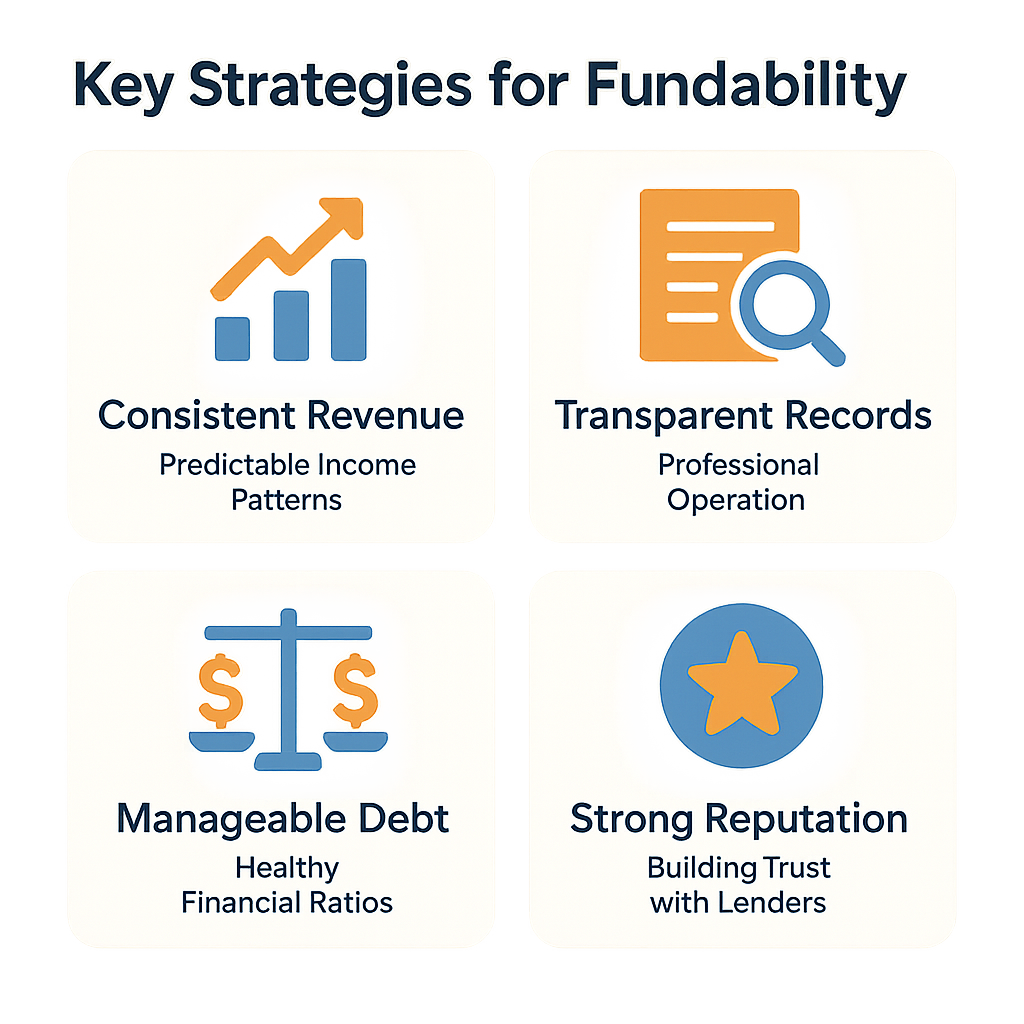5 Ways to Make Your Business More Fundable
Getting approved for business funding can feel like an uphill battle, especially when you're not sure what lenders are really looking for. The truth is, there are specific steps you can take to make your business significantly more attractive to potential funders. Whether you're considering a merchant cash advance or exploring other financing options, understanding what makes a business fundable could be the difference between approval and rejection.
The good news? Most of these improvements are within your control and don't require massive changes to your operations. From maintaining consistent revenue patterns to keeping transparent records, small adjustments in how you manage your business finances can open doors to funding opportunities you might not have qualified for before.
Essential Financial Documentation Requirements
Essential financial documentation requirements form the foundation of any successful funding application. Lenders need to see clear evidence of your business's financial health before they'll consider providing funding.
- Bank statements: Keep at least 6-12 months of consistent banking history that shows regular deposits and responsible account management
- Accounting records: Maintain organized books that accurately reflect your income, expenses, and cash flow patterns
- Tax returns: Have your business tax returns readily available for the past 2-3 years to demonstrate filing compliance
- Financial statements: Prepare profit and loss statements and balance sheets that give lenders a complete picture of your financial position
Building Consistent Revenue Streams

Building consistent revenue streams is crucial for demonstrating your business's ability to repay funding. Lenders typically look for businesses that can show predictable income patterns over time.
- Monthly revenue tracking: Document your monthly sales figures to show steady or growing income trends
- Customer retention: Focus on building repeat business relationships that provide reliable recurring revenue
- Diversified income sources: Develop multiple revenue streams to reduce dependence on any single customer or market
- Seasonal planning: If your business is seasonal, prepare documentation that explains your revenue cycles and cash management strategies
Maintaining Transparent Business Records
Maintaining transparent financial records shows lenders that you run a professional operation they can trust with their funding. Clean, organized records make the application process smoother and faster.
- Digital record keeping: Use accounting software to maintain accurate, up-to-date financial records that can be easily accessed and shared
- Receipt organization: Keep detailed records of all business expenses and income sources for tax compliance and transparency
- Legal documentation: Ensure all business licenses, permits, and legal documents are current and properly filed
- Audit trail: Create systems that allow you to trace every transaction and financial decision in your business operations
Step-by-Step Credit Building Process
A step-by-step credit building process can significantly improve your funding chances, even if traditional credit isn't the primary factor for certain financing options like merchant cash advances.
- Establish business credit: Open business credit accounts separate from your personal credit to build your company's financial reputation
- Pay bills on time: Consistently meet payment deadlines for utilities, suppliers, and other business obligations to demonstrate reliability
- Monitor credit reports: Regularly check both personal and business credit reports for errors and work to correct any inaccuracies
- Build vendor relationships: Work with suppliers who report payment history to credit bureaus to strengthen your business credit profile
Effective Debt Management Strategies
Effective debt management strategies help ensure your business maintains manageable debt levels that won't scare away potential lenders or create cash flow problems.
- Calculate debt-to-income ratio: Keep track of how much of your monthly revenue goes toward existing debt payments to maintain healthy ratios
- Prioritize high-interest debt: Focus on paying down the most expensive debt first to reduce overall financial burden on your business
- Avoid over-leveraging: Be cautious about taking on too much debt at once, as this can make future funding applications more challenging
- Create repayment plans: Develop clear strategies for managing existing obligations before taking on additional funding commitments
Key Takeaways for Funding Success
Making your business more fundable isn't about perfection, it's about preparation and consistency. The businesses that secure funding most easily are those that can quickly provide the documentation lenders need and demonstrate stable financial patterns. Remember that different types of funding may have different requirements, with some options like merchant cash advances focusing more on banking history and daily revenue patterns rather than traditional credit scores. Start implementing these strategies now, even if you don't need funding immediately, because building fundability takes time and the effort you put in today could pay off significantly when financing opportunities arise.
Implementing these 5 ways to make your business more fundable doesn't happen overnight, but the results can transform your access to capital. By focusing on consistent revenue, transparent records, manageable debt, and strong financial documentation, you're building the foundation that lenders want to see. The key is to start where you are and make incremental improvements that compound over time.
Remember, fundability isn't just about getting approved for financing, it's about positioning your business for long-term financial success. When you run your business with funding requirements in mind, you naturally develop better financial habits that benefit your bottom line whether you're seeking capital or not. Take action on these strategies today, and you'll be better prepared when the right funding opportunity comes along.

.png)






